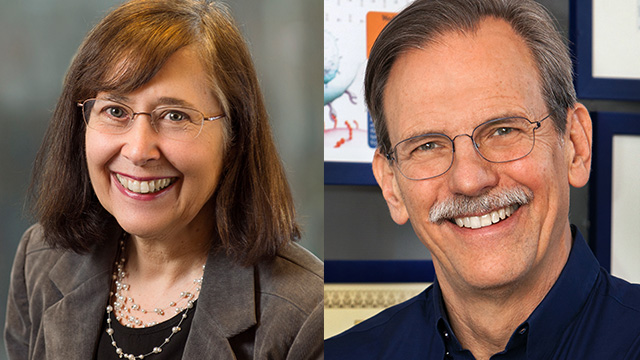
This year the Faculty of Medicine & Dentistry welcomes Connie Jean Eaves, winner of the 2019 Gairdner Wightman Award, and Timothy A. Springer, 2019 recipient of the Canada Gairdner International Award at the 2019 Canada Gairdner Symposium.
What makes a stem cell replicate? How do white blood cells recognize antigens? These are the types of questions you might get answers to at the upcoming Canada Gairdner Symposium Minds that Matter, hosted by the Faculty of Medicine & Dentistry (FoMD) on October 21, 2019.
The annual public event showcases the works of Canada's elite scholars who are driving forward important new discoveries on the front lines of medical research. Established in 1957, the Canada Gairdner Awards celebrate the world's leading biomedical and global health researchers through seven annual awards. Since its inception, there have been 380 recipients from 35 countries, 89 of whom have received Nobel Prizes.
This year the FoMD welcomes Connie Jean Eaves, winner of the 2019 Gairdner Wightman Award, and Timothy A. Springer, 2019 recipient of the Canada Gairdner International Award.
Connie Jean Eaves
Distinguished Scientist, Terry Fox Laboratory, BC Cancer
Professor, Department of Medical Genetics, University of British Columbia
Internationally acclaimed as a scientist, educator and leader, Eaves' research focuses on the cellular components of leukemia and breast cancer. Considered a trailblazer in the field of hematopoietic-the cells in the bone marrow responsible for the production of stem cells-Eaves' transformative discoveries and application of cutting-edge technologies have opened important new avenues of research toward the treatment and cure of these aggressive cancers.
Timothy A. Springer
Latham Family Professor of Biological Chemistry and Molecular Pharmacology
Professor of Medicine, Harvard Medical School and Boston Children's Hospital
Chair, Institute for Protein Innovation
Springer's discovery of the first immune system adhesion molecules-proteins that play a key role in transmission of information between cells to initiate an immune response-paved the way for innovative new approaches to autoimmunity. His body of work has changed scientific understanding of immunity at the cellular level, leading to new lines of treatment for multiple autoimmune diseases including psoriasis, multiple sclerosis, ulcerative colitis, Crohn's disease and cancer.
Event Details
When: Monday, October 21, 2019 from 2 to 4 p.m.
Where: Medical Sciences Building, room 2-27
This event is free and open to all who wish to attend.